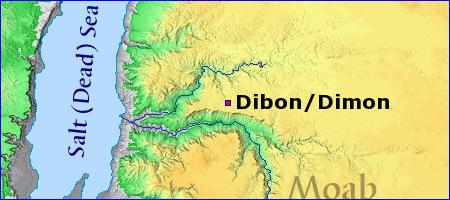(Remotely Related: Are the Isaiah 16:2 's "daughters of Moab" reference the same as the "outcasts" in Isaiah 16:3 & Isaiah 16:4? )
It may seem that this posting has too many questions but it is important to note that said questions are very closely related & intertwined with each other in regards to answering them. Therefore, it would be Disadvantageous if each question were placed in separate postings.
Isaiah 16:1-7 (NASB 1995)
1 Send the tribute lamb to the ruler of the land, From Sela by way of the wilderness to the mountain of the daughter of Zion. 2 Then, like fleeing birds or scattered nestlings, The daughters of Moab will be at the fords of the Arnon. 3 “Give us advice, make a decision; Cast your shadow like night at high noon; Hide the outcasts, do not betray the fugitive. 4 “Let the outcasts of Moab stay with you; Be a hiding place to them from the destroyer.” For the extortioner has come to an end, destruction has ceased, Oppressors have completely disappeared from the land. 5 A throne will even be established in lovingkindness, And a judge will sit on it in faithfulness in the tent of David; Moreover, he will seek justice And be prompt in righteousness. 6 We have heard of the pride of Moab, an excessive pride; Even of his arrogance, pride, and fury; His idle boasts are false. 7 Therefore Moab will wail; everyone of Moab will wail. You will moan for the raisin cakes of Kir-hareseth As those who are utterly stricken.
Isaiah 16:1-7 (NKJV)
1 Send the lamb to the ruler of the land, From Sela to the wilderness, To the mount of the daughter of Zion. 2 For it shall be as a wandering bird thrown out of the nest; So shall be the daughters of Moab at the fords of the Arnon. 3 “Take counsel, execute judgment; Make your shadow like the night in the middle of the day; Hide the outcasts, Do not betray him who escapes. 4 Let My outcasts dwell with you, O Moab; Be a shelter to them from the face of the spoiler. For the extortioner is at an end, Devastation ceases, The oppressors are consumed out of the land. 5 In mercy the throne will be established; And One will sit on it in truth, in the tabernacle of David, Judging and seeking justice and hastening righteousness.” 6 We have heard of the pride of Moab— He is very proud— Of his haughtiness and his pride and his wrath; But his lies shall not be so. 7 Therefore Moab shall wail for Moab; Everyone shall wail. For the foundations of Kir Hareseth you shall mourn; Surely they are stricken.
Isaiah 16:1-7 The Westminster Leningrad Codex
1 שִׁלְחוּ־כַ֥ר מֹשֵֽׁל־אֶ֖רֶץ מִסֶּ֣לַע מִדְבָּ֑רָה אֶל־הַ֖ר בַּת־צִיּֽוֹן׃
2 וְהָיָ֥ה כְעוֹף־נוֹדֵ֖ד קֵ֣ן מְשֻׁלָּ֑ח תִּֽהְיֶ֙ינָה֙ בְּנ֣וֹת מוֹאָ֔ב מַעְבָּרֹ֖ת לְאַרְנֽוֹן׃
3 ׳הָבִיאוּ׳ ״הָבִ֤יאִי״ עֵצָה֙ עֲשׂ֣וּ פְלִילָ֔ה שִׁ֧יתִי כַלַּ֛יִל צִלֵּ֖ךְ בְּת֣וֹךְ צָהֳרָ֑יִם סַתְּרִי֙ נִדָּחִ֔ים נֹדֵ֖ד אַל־תְּגַלִּֽי׃
4 יָג֤וּרוּ בָךְ֙ נִדָּחַ֔י מוֹאָ֛ב הֱוִי־סֵ֥תֶר לָ֖מוֹ מִפְּנֵ֣י שׁוֹדֵ֑ד כִּֽי־אָפֵ֤ס הַמֵּץ֙ כָּ֣לָה שֹׁ֔ד תַּ֥מּוּ רֹמֵ֖ס מִן־הָאָֽרֶץ׃
5 וְהוּכַ֤ן בַּחֶ֙סֶד֙ כִּסֵּ֔א וְיָשַׁ֥ב עָלָ֛יו בֶּאֱמֶ֖ת בְּאֹ֣הֶל דָּוִ֑ד שֹׁפֵ֛ט וְדֹרֵ֥שׁ מִשְׁפָּ֖ט וּמְהִ֥ר צֶֽדֶק׃
6 שָׁמַ֥עְנוּ גְאוֹן־מוֹאָ֖ב גֵּ֣א מְאֹ֑ד גַּאֲוָת֧וֹ וּגְאוֹנ֛וֹ וְעֶבְרָת֖וֹ לֹא־כֵ֥ן בַּדָּֽיו׃ ס
7 לָכֵ֗ן יְיֵלִ֥יל מוֹאָ֛ב לְמוֹאָ֖ב כֻּלֹּ֣ה יְיֵלִ֑יל לַאֲשִׁישֵׁ֧י קִיר־חֲרֶ֛שֶׂת תֶּהְגּ֖וּ אַךְ־נְכָאִֽים׃
There seem to be 4 major characters that are relevant in Isaiah 16:
- God
- Isaiah
- Moabite nation
- Israelite nation
One of the overall major themes/tenors of Isaiah 16 is a Devastating Prophetic Proclaimation over Isaiah 16.
As the aforementioned scripture passages shown above indicate, Isaiah 16:4's NKJV translation is starkly different from NASB1995
NKJV seems like Isaiah telling the Moabite nation that they should be helpful towards Israelite refugees
However, NASB1995 seems like Isaiah is telling the Israelite nation that they should be helpful toward the Moabite refugees
- (Isa 16:4) Are the refugees as Moabite Or Israelite?
- What are contextual consequences when it comes to choosing one translation over the other?
a) To add to the complexity factor, would taking into consideration the Old Testament Hebrew conjunctional phrases or terms that link the various verses in Isaiah 16:1-7 help us get a better understanding of Isaiah 16:1-7?
b) If yes, could someone please exegete said verses in the Old Testament Hebrew and provide their opinions?
